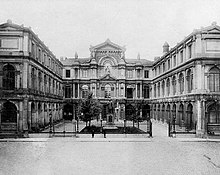Free University of Brussels (1834–1969)

The Free University of Brussels (
The "Linguistic Wars" affected the Free University, which split along language lines in 1969 in the aftermath of
History
Establishment of a university in Brussels

The Free University of Brussels was founded as the Free University of Belgium (Université libre de Belgique) on 20 November 1834 in the aftermath of
The motivating principle behind the new institution was "free inquiry" (libre examen) which denoted freethinking ideas inherited from the
After its establishment, the Free University faced difficult times, since it received no subsidies or grants from the government; yearly fundraising events and tuition fees provided the only financial means. Verhaegen, who became a professor and later head of the new university, gave it a mission statement which he summarised in a speech to King Leopold I: "the principle of free inquiry and academic freedom uninfluenced by any political or religious authority."[3] In 1858, the Catholic Church established the Saint-Louis Institute in the city, which subsequently expanded into a university in its own right.
Growth, internal tensions and move

The Free University grew significantly over the following decades. In 1842, it moved to the
In

The German occupation during World War I led to the suspension of classes for four years in 1914–1918. In the aftermath of the war, the Free University moved its principle activities to the Solbosch in the southern suburb of Ixelles and a purpose-built university campus was created, funded by the Belgian American Educational Foundation. The university was again closed by the German occupiers during World War II on 25 November 1941. Students from the university were involved in the Belgian Resistance, establishing Groupe G which focused on sabotage.
Splitting of the university

Until the early 20th century, courses at the Free University were taught exclusively in French, the language of the
On 1 October 1969, the French and Dutch entities of the Free University separated into two distinct sister universities. This splitting became official with the act of 28 May 1970, of the Belgian Parliament, by which the French-speaking Université libre de Bruxelles (ULB) and the Dutch-speaking Vrije Universiteit Brussel (VUB) officially became two separate legal, administrative and scientific entities.[10][11]
Notable faculty
- Nobel Prize for Peacein 1913.
- Jules Bordet (1870–1961): Nobel Prize in Physiology or Medicine in 1919.
See also
- List of modern universities in Europe (1801–1945)
- Category:Free University of Brussels (1834–1969) alumni
- First School War
- List of split up universities
References
- ^ "Pierre Théodore Verhaegen and St V". Vrije Universiteit Brussel. Retrieved 2023-02-25.
- ^ "A University born of an idea". Université libre de Bruxelles. Retrieved 2016-08-04.
- )
- ISBN 978-0-7190-8883-4.
- ^ Great Britain's first home Olympic football adventure by Jon Carter, ESPN, 26 Jun 2012
- ^ Before the World Cup: Who were football's earliest world champions? by Paul Brown on Medium Sports, 6 Jun 2018
- ^ Games of the II. Olympiad - Football Tournament by Søren Elbech and Karel Stokkermans on the RSSSF
- Belgian official journal. p. 4846. Retrieved 2023-02-25.
- ^ "About the University: Culture and History". Vrije Universiteit Brussel. Retrieved 25 November 2007.
- ^ "Chambre des Représen tant" (PDF).
- ^ "Law of 28 May 1970, concerning the splitting of the universities in Brussels and Leuven" (in Dutch). Belgisch Staatsblad/Flemish Government. Retrieved 25 November 2007.
